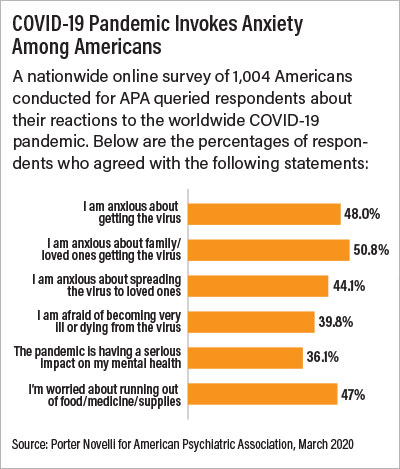COVID-19 Pandemic Is Taking MH Toll, Finds APA Poll
Abstract
Many Americans say that the pandemic has seriously impacted their mental health and worry that their family and loved ones will contract the virus.

Nearly half of Americans (48%) reported that they are anxious about the possibility of getting coronavirus (COVID-19), and nearly 40% are anxious about becoming seriously ill or dying from COVID-19, according to a national poll released last month by APA. But far more people (62% of those surveyed) are anxious about the possibility of family or loved ones being infected.
The findings were based on an online survey of a nationally representative sample of 1,004 U.S. adults aged 18 and older. It was conducted by Porter Novelli, a public relations consulting firm, on March 18 and 19.
More than one-third of respondents (36%) said that coronavirus is having a serious impact on their mental health, and a majority (59%) feel that coronavirus is having a serious impact on their day-to-day lives. Most respondents said they are concerned that the coronavirus will have a serious negative impact on their finances (57%), and almost half said they are worried about running out of food, medicine, and/or supplies. Two-thirds (68%) fear that the coronavirus will have a long-lasting impact on the economy.
“The stress and anxiety caused by the pandemic can and is having an effect on people’s physical and mental health,” said then APA President Bruce Schwartz, M.D. “During this time, it is important to do what we can to maintain self-care and manage the stress. I would suggest this for everyone coping at home as well as those who are still in their workplaces by necessity, especially the health care professionals on the front lines of this pandemic.”
Most respondents (68%) said they feel knowledgeable about coronavirus and preventing its spread. They were evenly split on whether they believe people are overreacting or being overly cautious when it comes to coronavirus; just roughly 21% are uncertain. About a third of the respondents are concerned about not being able to access tests and health care if needed.
Most respondents reported that, despite the high levels of anxiety resulting from coronavirus, they have not yet felt significant behavioral impacts. Only 19% reported having trouble sleeping, 8% are consuming more alcohol or other drugs/substances, and 12% are fighting more with their partner or loved ones (because of being stuck at home together). About 24% said they have had trouble concentrating on other things because they are thinking about coronavirus.
The poll also indicated a high level of uncertainty. About a fifth of the respondnets said they are neutral on many issues, such as feeling knowledgeable about coronavirus and current guidelines and the current and potential impacts of coronavirus on their health and finances.
“The poll highlights both the anxiety caused by the pandemic and the need for clear, consistent communications on how to prevent the spread of COVID-19,” said APA CEO and Medical Director Saul Levin, M.D., M.P.A. “In the disruption COVID-19 is causing, everyone needs to make sure they are taking the time to take care of their own physical and mental health, alongside their families, friends, and work colleagues. Social isolation can be prevented by taking the time to use social media, letters, or simply the phone to communicate with loved ones and friends, particularly those we haven’t been in touch with over the years as we would have liked. Together, we will get through this.”
The poll was conducted online via a Porter Novelli PN View: 360 survey. Respondents were evenly split by gender (51.7% female; 48.3% male) Regarding geographic region, 17.8% were from the Northeast, 20.8% were from the Midwest, 37.6% were from the South, and 23.7% were from the West. The average age was 46.8 years. The margin of error is +/-3.1% at the 95% confidence level. ■



